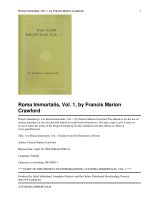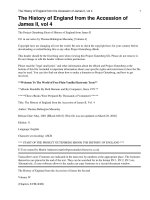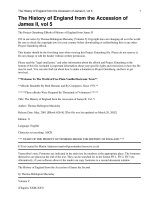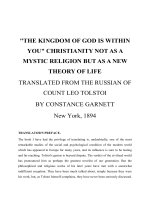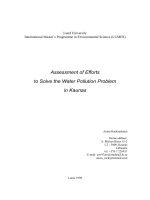Excerpt from the Examination Regulations for the Master’s Program in Economics at the University of Mannheim docx
Bạn đang xem bản rút gọn của tài liệu. Xem và tải ngay bản đầy đủ của tài liệu tại đây (240.41 KB, 15 trang )
Exerpt: Examination Regulations MSc Economics
- 1 -
Excerpt from the
Examination Regulations for the Master’s Program in Economics
at the University of Mannheim
Please note:
This English translation is based on the German version of the Examination Regulations for the
Master’s Program in Economics. The German original is the only legally binding version. Any
liability for mistakes arising from the translation of the original shall be excluded.
Contents
General Regulations 2
Academic Degree 2
Duration of the program 2
Program structure 2
Language of instruction 2
Course volume 2
Structure of exams, deadlines 2
Maternity protection and parental leaves 3
Flexible deadlines 3
Recognition of study periods and credits 4
Assessment of exams 5
Admission to the field of study „Economic Research“ 7
Examination Procedure 7
Registration and admission to exams 7
Scope and structure of examinations 7
Re-takes 8
Master’s thesis 8
Passing the program and transcript of records 10
Closing provisions 11
Invalidity of the master’s examination 11
Post-exam review 11
Attachment 1 12
Attachment 2 14
Exerpt: Examination Regulations MSc Economics
- 2 -
General Regulations
Academic Degree
Upon successful completion of the master’s curriculum the University of Mannheim awards the
academic degree „Master of Science” (M.Sc.).
Duration of the program
The prescribed period of study is four semesters. The program has been designed in such a way
as to enable students to finish their studies within this period.
The curriculum has to be completed by the end of the seventh semester. Otherwise, the student
has forfeited his right to earn the degree, unless he was not responsible for failing to observe the
deadline. Upon request, the deadline can be extended by the chairman of the examination board.
Program structure
The master’s program in economics is structured into a one semester introductory phase, a two
semester specialization phase and a one semester research phase. The detailed program structure
depends on the field of study (“Economics” or “Economic Research”) and is shown in the
attachments to this document.
Language of instruction
The language of instruction is English. In singular cases the examination board can, in
consultation with the examiner, allow for other languages of instruction. All examinations are
conducted in the language of instruction. Examiners can decide to optionally allow German as
language of examination in case of oral exams. The master’s thesis has to be written in English.
In exceptional and justified cases the master’s thesis can be written in German. The decision
remains with the supervisor of the thesis.
Course volume
The complete program covers a minimum of 120 ECTS credits. One ECTS credit equals a
workload of 30 hours.
Structure of exams, deadlines
To complete the master’s program students have to take the following exams:
In the field of study „Economics“: exam for each course, completion of at least two
seminars and a master’s thesis
Exerpt: Examination Regulations MSc Economics
- 3 -
In the field of study “Economic Research”: exam for each course and a master’s thesis
Exams for courses offered by the Department of Economics are usually conducted in the form of
written tests at the end of the course. These tests can be replaced (for all students likewise)
completely or in parts by one or several assignments and/or one or several presentations and/or
one or several interim tests and/or an oral exam at the end of the course. The pass criteria and
weighting of each partial performance should be communicated in advance. The decision about
the examination type and weighting of each performance lies with the examiner. Exams for
courses offered by other schools or departments are conducted according to their own
examination regulations.
Students have the right to earn their course credits in other forms than the designated exam type
in case they provide medical evidence that they are not able to take the exam partly or
completely in the designated form due to a long-lasting or permanent physical disability. A
request has to be filed on the date of registration for the exam. The decision of the examination
board has to be put on record.
Maternity protection and parental leaves
Students have the right to take a leave in accordance with maternity protection and parental
leave laws. A written request to the examination board is necessary.
During a maternity protection period all deadlines of these examination rules are suspended.
For students on parental leave the examination board defines new deadlines. The master’s thesis
cannot be adjourned for the time of a parental leave. If the deadline is exceeded in such a case,
the assigned topic will be withdrawn and a new topic is assigned after the parental leave.
Flexible deadlines
Upon request, flexible deadlines can be granted if students face family obligations. This applies
especially to students with children under 3 years old. Deadlines for re-takes can be extended by
a maximum of 2 semesters. As soon as the prerequisites for granting an extension no longer
apply, the extension expires.
In cases of long-lasting illness or disability which makes it impossible to regularly participate in
the courses, students can be granted extensions of deadlines. Deadlines for re-takes can be
extended by a maximum of 2 semesters.
Students who have been elected into the student body council for at least one year can be
granted an extension of deadlines for a maximum of 2 semesters.
Exerpt: Examination Regulations MSc Economics
- 4 -
Recognition of study periods and credits
Academic credits received at an accredited university or higher education institution in Germany
or abroad or at a university of cooperative education of the Federal Republic of Germany will be
transferred if the competences acquired are not essentially different from the academic
requirements that will be replaced.
For the transfer of credits from foreign institutions agreements between the Federal Republic of
Germany and other countries concerning the equivalency of higher education and agreements in
the context of university partnerships and double degree programs (cooperation agreements)
have to be taken into account. In case of doubt about the equivalency, the Central Office for
Foreign Education can be consulted.
For knowledge and skills acquired outside of the system of higher education academic credits are
granted if
a) the requirements for university admission are fulfilled at that time of receiving credit;
b) the content and level of the knowledge and skills are equivalent to the academic credits
that are to be replaced;
c) the criteria for receiving credit have been reviewed in the context of an accreditation
process.
To receive academic credit for documented competences acquired outside of the system of higher
education, the applicant has to prove their equivalency - in kind and breadth - with the academic
requirements that are to be replaced.
Knowledge and skills acquired outside of the system of higher education can replace a maximum
of 50% of the credits in a degree program. The regulations about the transfer of credits from
universities of cooperative education remain unaffected.
The examination board decides about the transfer of credits upon request. It rests upon the
student to submit all required documents regarding his/her achievements for which he requests
to receive academic credits to the examination board.
If credits are transferred and the grading systems are comparable, the grades are carried over
according to these examination regulations and will be included into the calculation of the
cumulative grade point average (GPA). For the conversion of foreign grades, the examination
board can define conversion rules in accordance with statutory provisions. If the grading systems
are not comparable or a conversion is not possible, the credits will be transferred as “passed” and
will not be included into the calculation of the cumulative GPA. Transferred credits are labeled as
such in the transcript of records.
Exerpt: Examination Regulations MSc Economics
- 5 -
If a student participates in an exam within a degree program at the University of Mannheim,
although he/she already acquired the relevant competences elsewhere, he/she renounces the
transfer of credits for these achievements.
Absence, withdrawal, cheating, and breach of regulations
If a student does not show up for an exam for which he registered or withdraws from an exam
without a valid reason, he will receive the failing grade 5.0. The same applies if an assignment is
not handed in on time.
If a candidate has a valid reason for withdrawing from or missing an exam, he must present the
examination board with certified documentation in writing in a due time. In case of sickness a
doctor’s certificate has to be provided. In case of doubt the university can ask for a certificate
from a doctor named by them. If the reasons are accepted as valid, the exam has to be taken at
the next possible date. Existing partial results are taken into account.
If a student tries to influence his exam grade by cheating or by using prohibited materials or
resources, he will receive the failing grade 5.0. A student who disturbs the exam can be excluded
from the exam by the examiner or supervisor. In this case, the student receives the failing grade
5.0. Within two weeks after the exam, the student can request a review of the decision by the
examination board. The student has to be informed promptly about incriminating decisions in
writing. An instruction on the right to appeal has to be included.
In severe cases students can be excluded from all future exams by the examination board.
Assessment of exams
Grades for exams and the master’s thesis are determined by the examiner or master’s thesis
supervisor. The following grades are used:
1.0 (very good)
2.0 (good)
3.0 (satisfactory)
4.0 (fair)
5.0 (failed)
For further differentiation of the assessment the value 0.3 can be added or distracted from the
grade. However, the grades 0.7, 4.3, 4.7 and 5.3 are impossible.
The minimum pass grade is 4.0. ECTS credits are only earned for passed exams.
Exerpt: Examination Regulations MSc Economics
- 6 -
If an assessment is based on more than a single performance, a rounded mean of all
performances is calculated. The grade is then determined as the grade (from those defined above)
which comes closest to this rounded mean. In case of doubt the better grade has to be assigned.
Academic credits which are not graded are assessed as follows:
P (pass)
F (fail)
The grades for written exams should be announced within 4 weeks of the exam date and at least
3 weeks before the date of the re- exam.
The final grade for the master’s program is the ECTS weighted mean of all grades received within
the curriculum (according to the regulations in attachment 1 and 2).
The final grade is:
Very good: for a mean value up to 1.5
Good: for a mean value between 1.6 and 2.5
Satisfactory: for a mean value between 2.6 and 3.5
Fair: for a mean value between 3.6 and 4.0
When determining the final grade only the first decimal place is considered; all further decimal
places are cut off without rounding.
In addition to the final grade a relative grade according to the ECTS scale can be reported in the
Diploma Supplement:
A = for the top 10 %
B = for the next 25 %
C = for the next 30 %
D = for the next 25 %
E = for the bottom 10 %
The calculation is usually based on the three previous graduating classes of the master’s program
in economics.
Once a student has earned at least 30 ECTS credits, a provisional GPA can be reported on the
transcript of record upon request.
Exerpt: Examination Regulations MSc Economics
- 7 -
Admission to the field of study „Economic Research“
Admission to the field of study “Economic Research” is granted after the first semester.
Requirements are:
an application by the student;
the completion of all courses in the introductory phase and a mean grade of at least 2.5;
a positive evaluation by the examination board.
The examination board takes the decision after consulting the lecturers of the introductory phase
and, if necessary, an interview with the applicant.
The admission to the field of study “Economic Research” will be changed into an admission to
the field of study “Economics” in case the student
requests it, or
does not pass at least 5 core courses of the specialization phase or does not achieve a
mean grade of at least 2.5 in these courses.
The chairman of the examination board issues an official notification about the decision of
admission which contains an instruction on the right to appeal.
Exams taken in core courses of the field of study “Economic Research” are recognized in the field
of study “Economics” in case of a change of the field of study.
Examination Procedure
Registration and admission to exams
To participate in exams students have to register for them within a deadline appointed by the
Student Service Center. The withdrawal of a registration is only possible within the same
deadline.
No registration is necessary for the core courses in the first semester. These exams are compulsory
and all students are registered automatically.
Scope and structure of examinations
To earn the master’s degree in economics students have to successfully complete
1. the core courses in the introductory phase;
2. the elective courses in the specialization phase
Exerpt: Examination Regulations MSc Economics
- 8 -
3. the master’s thesis.
The core courses and regulations concerning the elective courses can be found in the
attachments.
In the specialization phase students can choose from different lectures, sometimes with a related
exercise, and two to four seminars in the field of study “Economics”. In cases of doubt the
examination board decides about identity of content.
The duration of exams in the core courses offered by the Department of Economics is at least 30
minutes and at maximum 90 minutes per contact hour and at least 90 minutes in total. Details
about the duration of exams can be found in the attachments. The first exams should always
take place in the last week of the lecture period or at the beginning of the following lecture-free
period. The re-take should take place before the following semester starts and are part of the
semester in which the first exam took place.
The duration of exams in core courses offered by other departments are defined in the
attachments. The duration of exams in elective courses offered by other departments and the
regulations about re-takes in these courses are subject to regulations that are in place at these
departments.
Re-takes
Each failed exam from the introductory phase has to be re-taken at the next possible date. If the
exam was an interim test with a weight of less than 50% of the course grade, the examiner
decides if a re-take will take place. Missed re-takes count as failed and will be graded as such
(5.0) unless the student was not responsible for missing it.
A second re-take is only possible for one single exam of the introductory phase. If this second re-
take is not passed, the student has failed the master’s program and has forfeited his/her
admission.
A re-take of a passed exam is only allowed for one single exam of the introductory phase. For the
GPA and provisional PA the better grade will be used. Additional re-takes of passed exams are
not allowed.
In the specialization phase no re-takes are possible. If a student fails an exam, he/she has to take
a course with different content instead.
Master’s thesis
The master’s thesis can be written in any of the following subjects:
Economics
Exerpt: Examination Regulations MSc Economics
- 9 -
Statistics and econometrics
Economic history
Economic geography
The master’s thesis cannot be started before the fourth semester. In addition the candidate has to
complete at least one seminar in the field of study “Economics”. Furthermore at least 45 ECTS
credits have to be earned in the specialization phase.
The candidate is assigned a topic according to the subject chosen from the examiner. The
candidate may also suggest a topic. The issuance of a topic, supervision, and assessment of the
master’s thesis can only be administered by professors, junior professors, and affiliated professors.
A assigned topic can be returned once within the first four weeks of the processing time; in this
case the master’s thesis is treated as if it has not started yet.
The processing time depends on the field of study and is given in the corresponding specific
attachment. The supervisor makes sure that topic, problem and scope can be dealt with in the
scheduled processing time. The finalized master’s thesis has to be submitted in duplicate to the
supervisor. The deadline can also be complied with by submitting the master’s thesis as a
registered letter. The date of issuance and submission has to be put on record. The examination
board may require an electronic copy.
In exceptional and justified cases the examination board may grant a deadline extension to
candidates who have applied for postponement of submission of their master’s thesis. The
maximum extension is four weeks. In addition, the application for a deadline extension has to be
submitted one week prior to the end of the processing period at the latest. The candidate must
have the approval of his/her supervisor.
The candidate has to attach an appendix containing all sources used. Additionally, a written
assurance has to be included stating that:
The work has been done independently and without the use of other sources except for
those listed in the appendix.
All passages which are directly or indirectly taken from external sources are labeled as
such.
The work has not been presented in this or any similar form to any examination authority
before.
The master’s thesis is assessed by the examiner who has issued the topic. The assessment is made
according to the “assessment of exams” part. In case of failure (5.0) a second assessor has to be
designated by the examination board. If the two assessments differ, the final grade is calculated
as the arithmetic mean of the two individual grades (and rounded to the nearest available grade
Exerpt: Examination Regulations MSc Economics
- 10 -
of the grading system). In case of doubt the better grade has to be assigned. Submitting late
automatically leads to “failed” (5.0) without consulting a second assessor.
The candidate should be informed about the grade he/she received for the master’s thesis no later
than two month after submission.
The minimum grade for passing the master’s thesis is 4.0. If passed, the candidate earns the
amount of ECTS credits assigned to the master’s thesis (see respective attachment).
A failed master’s thesis can only be re-taken once. When re-taking the master’s thesis a new topic
is issued. A passed master thesis cannot be re-taken.
The supervisor can require the candidate to attend an accompanying master’s colloquium.
Passing the program and transcript of records
The program is passed if at least 120 ECTS credits have been obtained. The binding regulations
regarding the composition of these credits can be found in the attachments 1 and 2.
The program is ultimately failed if any re-take is failed at the latest possible date.
Every candidate who passed the program is awarded a transcript of records both in English and
German. The transcript of records contains:
1. All examinations including the master’s thesis with all ECTS credits and grades (both in
text and numerical);
2. The topic of the master’s thesis as well as the name of the examiner;
3. The cumulative grade point average (GPA) (both in text and numerical);
4. A final grade as outlined in the section “Assessment of exams”, line (3).
The transcript of records will be date stamped with the date of the last examination. In case this
date is not determinable, the last lecture day of the semester is regarded to be the final date.
Every transcript of records has to be signed by the chairman and his/her deputy of the
examination board.
Together with the transcript of records every candidate is given a certificate (both in English and
German) which awards the Master of Science (M.Sc.) degree and contains the final grade. The
certificates are date stamped with the same date as the transcripts of records. They will be signed
by the dean and his deputy and sealed with the seal of the University of Manheim.
The academic title must not be born before receiving these certificates.
Outstanding performances (up to a final grade of 1.2) will be acknowledged with the assessment
“graduated with honors” on the transcript of records and the certificates.
Exerpt: Examination Regulations MSc Economics
- 11 -
In addition to the transcript of records every candidate receives a Diploma Supplement according
to the European Diploma Supplement Model. The Diploma Supplement includes a transcript of
records listing all modules, the corresponding grades, and awarded ECTS credits.
In case of an ultimately failed master’s examination an official notification will be issued.
In case a candidate has ultimately failed the master’s examination he/she can request a written
statement listing all the exams taken and grades obtained. This statement will also contain the
information that the candidate ultimately failed the master’s exam.
Closing provisions
Invalidity of the master’s examination
If the candidate cheats during an exam and this is discovered after the transcript of records has
been released to the candidate, the examination board is authorized to correct the awarded grade
retroactively and also to declare this exam partly or fully failed.
In case the prerequisites for participating in an exam were not met by a candidate but he/she still
participated and passed the exam and received a transcript, the following rules apply: As long as
the candidate did not try to deceive about not having fulfilled the prerequisites, he/she still
passes the exam. However, if the candidate has deliberately ignored missing prerequisites, the
case is subject to the examination board’s decision. The candidate is given the opportunity to
make a statement on his/her situation before a decision is made. Any false documents and
certificates will be retracted and if applicable a new, corrected document is issued.
Post-exam review
Upon request candidates are granted a post-exam review. The examiner or the Student Services
will set the time and place for the review. Any request for a post-exam review has to be made
within a year after receiving the grade for that exam.
Attachment 1
Field of study: Economics
Degree: Master of Science (M.Sc.)
Course volume in ECTS credits: 120 - 126
For courses offered by the Department of Economics in the field of study „Economics“, the
following ECTS credits are awarded:
- Lectures: for each semester hour in the specialization phase: 2,5 ECTS credits
- Exercises: for each semester hour in the specialization phase: 2 ECTS credits
- Seminars:
for 2 semester hours: 5 ECTS credits
for 3 semester hours: 6 ECTS credits
Exceptions: No credits for the department seminar and CDSE seminar!
If credits from courses in other master’s programs at the University of Mannheim are recognized,
the ECTS credits awarded there apply. If the European Credit Transfer System is not used, credits
will be awarded according to the above scheme.
Introductory Phase (1
st
semester)
Core Modules
Duration of exam (min)
ECTS credits
Modul 1: E700 Mathematics for Economists
135
6
Modul 2: E701 Advanced Microeconomics
180
8
Modul 3: E702 Advanced Macroeconomics
180
8
Modul 4: E703 Advanced Econometrics
180
8
30
Specialization Phase (2
nd
- 3
rd
semester)
Elective Modules
Elective Modules from the master’s program in economics at the Department of
Economics, including at least 2 and max. 4 seminars.
From the following master’s programs at the University of Mannheim 15 ECTS
credits can be recognized: „Mannheim Master in Management“(Business
Administration Module), „Master in Political Science“, „Master in Sociology“,
„Master in Law“ and „Master in Mathematics
60 – 66
Research Phase (4
th
semester)
Research Module
Master’s thesis (and, if required, attendance at a master’s colloquium)
The processing time is four months.
30
Total:
120 - 126
Attachment 2
Field of study: Economic Research
Degree: Master of Science (M.Sc.)
Course volume in ECTS credits: 120 - 126
For courses offered by the Department of Economics in the field of study „Economic Research“,
the following ECTS credits are awarded:
- Lectures: for each semester hour in the specialization phase: 2,5 ECTS credits
- Exercises: for each semester hour in the specialization phase: 2 ECTS credits
- Seminars:
for 2 semester hours: 5 ECTS credits
for 3 semester hours: 6 ECTS credits
Exceptions: No credits for the department seminar and CDSE seminar!
If credits from courses in other PhD programs at the University of Mannheim are recognized, the
ECTS credits awarded there apply. If the European Credit Transfer System is not used, credits will
be awarded according to the above scheme.
Introductory Phase
Core Modules (1
st
semester)
Duration of exam (min)
ECTS credits
Modul 1: E700 Mathematics for Economists
135
6
Modul 2: E701 Advanced Microeconomics
180
8
Modul 3: E702 Advanced Macroeconomics
180
8
Modul 4: E703 Advanced Econometrics
180
8
Sum
30
Specialization Phase
Core Courses (2
nd
semester)
Modul 5: E801 Advanced Microeconomics II
135
5
Modul 6: E802 Advanced Macroeconomics II
135
5
Modul 7: E803 Advanced Econometrics II
135
5
Modul 8: E804 Advanced Microeconomics III
135
5
Modul 9: E805 Advanced Macroeconomics III
135
5
Modul 10: E806 Advanced Econometrics III
135
5
30
Elective Courses (3
rd
- 4
th
semester)
Elective Modules from the courses offered by the Graduate School. At least four
courses have to be chosen from the CDSE program.
40 - 46
Research Phase
Core Courses (3
rd
- 4
th
semester)
E800 CDSE-Seminar (in the 3
rd
and 4
th
semester)
no ECTS credits
Department seminar
no ECTS credits
Research Modul (4
th
semester)
Master’s thesis (dissertation proposal)
The processing time is eleven weeks.
20
Total:
120-126




